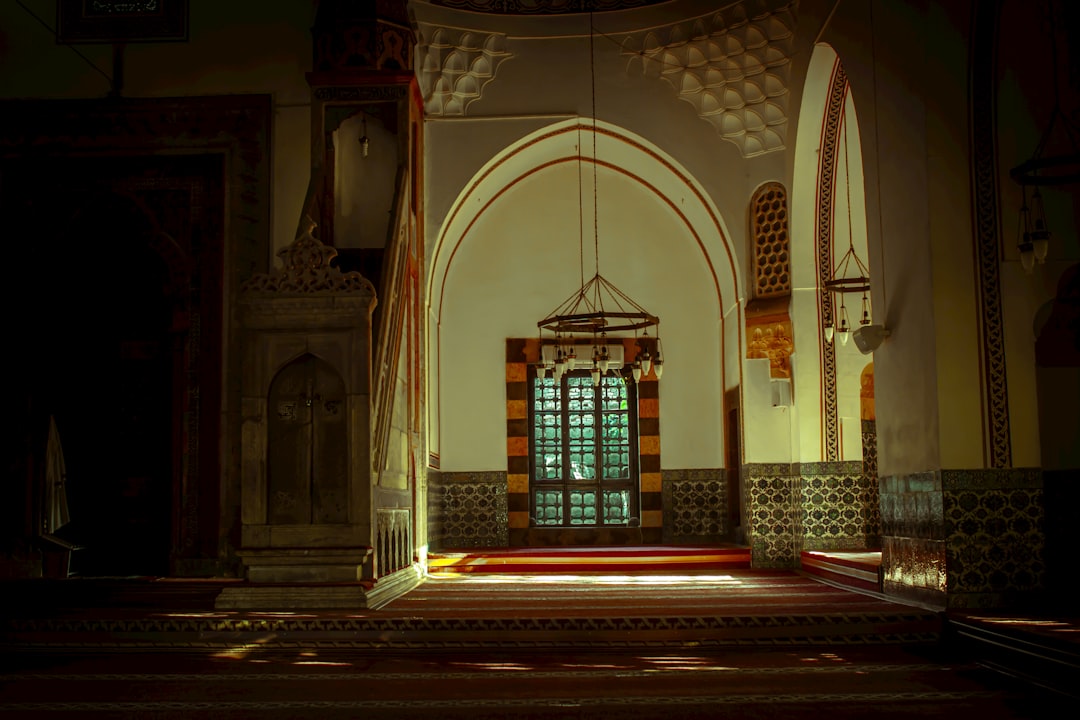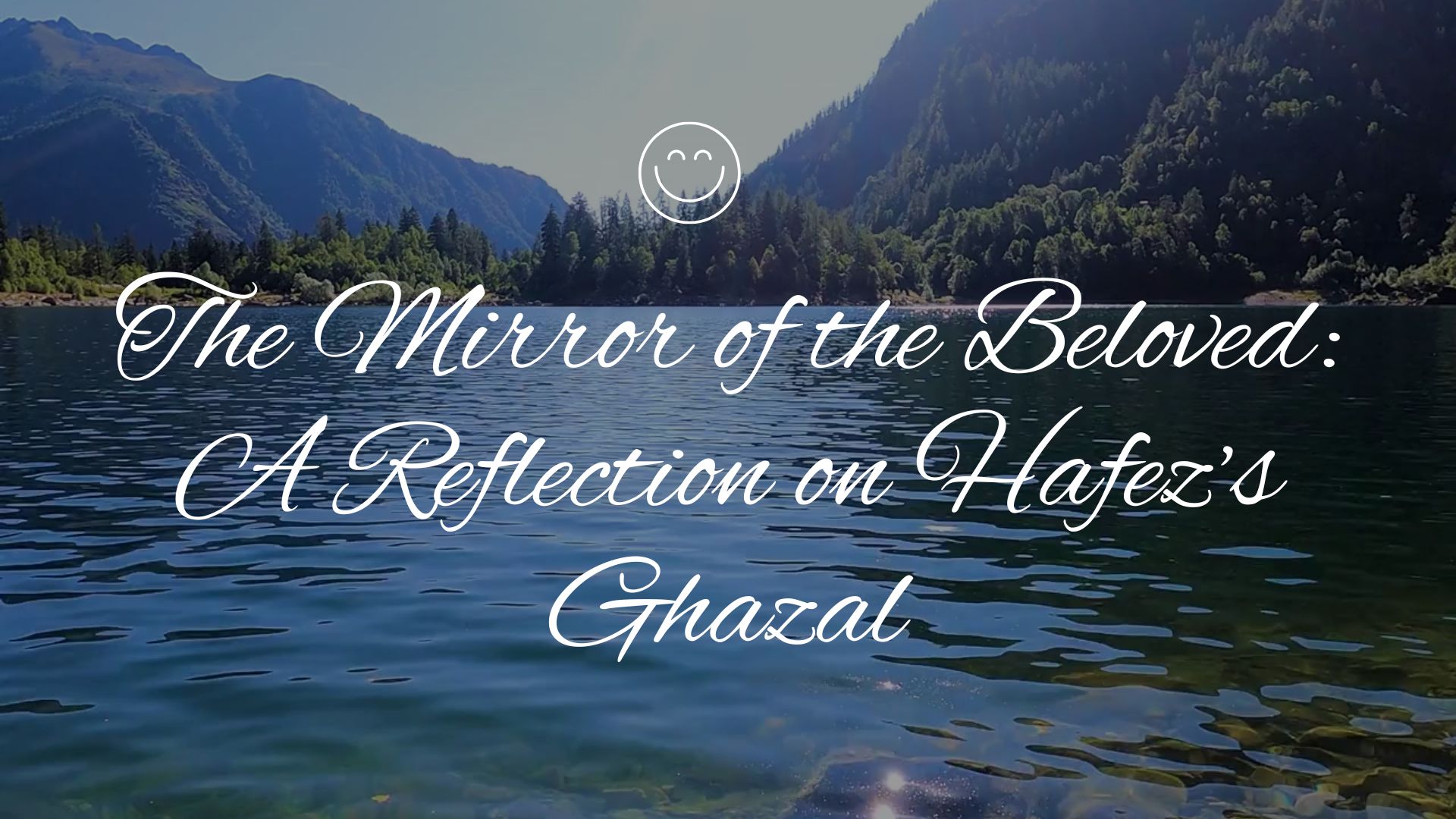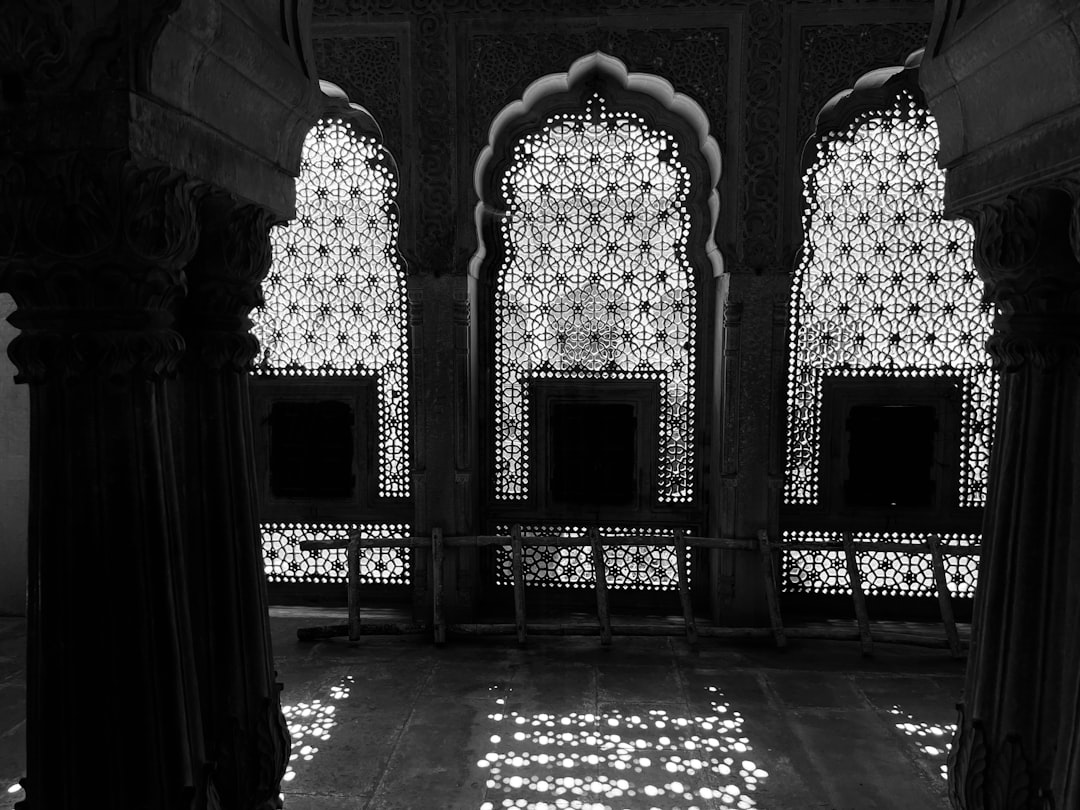This is a beautiful ghazal by ʿErāqī (Iraqi) and it is one of the most profound expressions of the Sufi journey from selfhood to annihilation, from worship to wonder, from reason to rapture.
مست خراب یابد هر لحظه در خرابات
گنجی که آن نیابد صد پیر در مناجات
خواهی که راه یابی بیرنج بر سر گنج
میبیز هر سحرگاه خاک در خرابات
یک ذره گرد از آن خاک در چشم جانت افتد
با صدهزار خورشید افتد تو را ملاقات
ور عکس جام باده ناگاه بر تو تابد
نز خویش گردی آگه، نز جام، نز شعاعات
در بیخودی و مستی جایی رسی، که آنجا
در هم شود عبادات، پی گم کند اشارات
تا گم نگردی از خود گنجی چنین نیابی
حالی چنین نیابد گم گشته از ملاقات
تا کی کنی به عادت در صومعه عبادت؟
کفر است زهد و طاعت تا نگذری ز میقات
تا تو ز خودپرستی وز جست وجو نرستی
میدان که میپرستی در دیر عزی و لات
در صومعه تو دانی میکوش تا توانی
در میکده رها کن از سر فضول و طامات
جان باز در خرابات، تا جرعهای بیابی
مفروش زهد، کانجا کمتر خرند طامات
لب تشنه چند باشی، در ساحل تمنی؟
انداز خویشتن را در بحر بینهایات
تا گم شود نشانت در پای بینشانی
تا در کشد به کامت یک ره نهنگ حالات
چون غرقه شد عراقی یابد حیات باقی
اسرار غیب بیند در عالم شهادات
English translation of ʿErāqī’s ghazal:
The Tavern of the Infinite
A Ghazal by Fakhr al-Dīn ʿErāqī : English translation
Each moment in the tavern’s ruin, the drunkard finds a treasure
A treasure no old ascetic gains through lifetimes of devotion.
If you would find the treasure without the ache of toil,
Then every dawn, cast the dust of the tavern upon your head.
Should but a mote of that dust fall into your soul’s eye,
A hundred suns will rise within you in one meeting.
And if the reflection of the wine-cup’s glow should touch you,
You’ll know not yourself, nor the cup, nor even the shining light.
In that drunkenness, that sweet unknowing, you reach a place
Where prayer dissolves, and worship loses all direction.
Until you vanish from yourself, you’ll never find such treasure
This state remains unseen by those still seeking the meeting.
How long will you, by habit, pray within the cloister walls?
Until you pass beyond the veil, piety itself is disbelief.
Until you break from self-love and the hunt for gain,
Know that your worship is still before idols of Lat and ʿUzzā.
You know the art of struggle within the monastery,
But in the tavern, cast away your pride and learned words.
Give up your soul in that ruin; there you’ll taste one drop
Sell not your piety; its price is worth but little there.
How long will you thirst upon the shore of longing?
Throw yourself into the sea of endlessness!
Until your trace is lost upon the path of tracelessness,
Until the whale of states swallows you in a single draught.
When ʿErāqī drowned, he found eternal life
He saw the secrets of the Unseen in the world of the Seen.
There is a place where the worshipers of night and the wanderers of dawn meet,
not in the mosque, nor in the temple,
but in the tavern of ruin, the house of divine intoxication.
There, where reason is lost and the heart burns like a lamp,
ʿErāqī leads us, cup in hand, whispering truths that can only be sung through ecstasy.
“The drunk in the tavern finds each moment a treasure
That a hundred ascetics fail to find in a lifetime of prayer.”
What is this tavern? What is this ruin?
It is the ruin of the self, the fall of the false temple we build around our egos,
the crumbling of the “I” that dares to stand between the lover and the Beloved.
ʿErāqī does not mock devotion; he completes it.
He turns the prayer beads into wine cups, the prostration into a dance.
He reminds us that the real pilgrimage begins when the soul turns inward,
and finds no Kaʿbah but the heart,
no Imam but love itself.
The Treasure in Ruin
In the first verse, the poet shocks us awake:
he declares that the drunkard, the one staggering through divine madness,
finds in every breath a hidden treasure,
a joy, a revelation, a meeting with the Beloved,
that the disciplined ascetic, lost in ritual, never discovers.
This is not to scorn worship, but to unveil its purpose.
Prayer without love is a shadow. Fasting without presence is mere hunger.
But a single sigh in love, even a broken sigh,
is worth more than a thousand perfect bows.
When the heart is shattered in longing,
God enters through the cracks.
“If you wish to find the treasure without pain,
Each morning scatter the dust of the tavern upon your head.”
The tavern’s dust, that sacred ruin, is not filth, but blessing.
It is the humility that makes one bow lower than the dust itself.
ʿErāqī calls it “the dust of the tavern,”
but the mystics know it as the soil of annihilation,
the very ground upon which all false idols, of self, name, and form, dissolve.
To scatter that dust upon your head is to say:
“I am nothing, and You are all.”
And in that nothingness, all treasures unfold.
The Meeting with a Hundred Suns
“If but a speck of that dust touches the eye of your soul,
You will behold a hundred suns rising within you.”
The light of the Beloved is not a distant star; it is already within.
Yet the eye must be cleansed, the mirror of the heart polished,
before it can reflect that inner sunrise.
This “hundred suns” is not exaggeration;
it is the infinite brilliance of awakening, the multiplicity of divine attributes revealed at once.
When love enters the heart,
the world no longer hides the Divine; it reveals it.
Every breath becomes a revelation,
every tear, a prayer,
every silence, a song.
And yet, this vision comes only after surrender.
The poet warns us: the reflection of the wine-cup may dazzle,
but do not mistake the image for the wine itself.
“If the reflection of the cup’s wine should fall upon you,
You will forget yourself, the cup, and even the light that shines.”
Here ʿErāqī describes the moment when self-awareness dissolves completely;
the state of fanāʾ, annihilation in the Beloved.
The lover no longer knows where “I” ends and “You” begins.
In that timeless moment, there is only the One,
drinking Itself, loving Itself, knowing Itself through the mirror of creation.
When Prayer Melts into Love
“In that drunkenness and self-forgetfulness you’ll reach a place
Where prayer and worship vanish, and gestures lose their way.”
This is the mystical paradox, the point where form dissolves into essence.
ʿErāqī does not tell us to abandon worship, but to transcend it.
When love becomes your breath, your silence, your pulse,
you no longer need to count your prayers,
for every heartbeat is already saying Allāh.
In that state, religion is no longer a map, it becomes the destination.
The lover no longer asks, “What is right?”
but instead whispers, “Let Your will be done in me.”
This is the death of the ego, the melting of ice into sea.
The separate self dissolves, and only the ocean remains.
All gestures of devotion, bowing, fasting, pilgrimage,
become rivers flowing back into the same source.
Losing Yourself to Find Everything
“Until you lose yourself completely, you will not find this treasure;
Such a state cannot be found by those still clinging to the meeting.”
How tenderly ʿErāqī describes the hardest step: to lose oneself.
The greatest veil between the seeker and the sought is the seeker himself.
So long as “I” remain, even “I, the lover,” or “I, the devout”
the ocean cannot swallow the drop.
To lose yourself does not mean despair,
but to shed everything that is not Love.
When you have no name left, no claim left,
no possession, no opinion, only yearning
then Love itself finds you.
And when It does, the “meeting” vanishes.
For who meets whom,
when there is no separation?
Beyond the Cloister: The Fall of False Piety
“How long will you worship by habit in the monastery?
Until you pass beyond the veil, piety itself is disbelief.”
This verse stings, yet it is pure mercy.
ʿErāqī warns us that spiritual life can become its own idol.
The monk’s cell, the scholar’s robe, the saint’s reputation,
all can become chains if the heart is not free.
True devotion begins when even worship itself is burned in the fire of love.
Then, prayer is no longer a duty but a delight.
The tongue may fall silent,
but the soul continues to whisper in adoration.
“Until you are freed from self-worship and the search for reward,
Know that your temple is still the house of idols.”
This is one of ʿErāqī’s boldest insights.
He declares that even the search for paradise is still self-centered.
As long as “I” desire heaven or fear hell,
the self remains, subtle but present.
But when love alone drives you,
when heaven and hell both vanish in the face of the Beloved’s beauty,
then you have truly escaped idolatry.
The Tavern as Temple
“You know the path of struggle in the cloister,
but in the tavern, abandon your pretenses and clever words.”
In the tavern of love, logic is useless.
The wine there cannot be measured or reasoned, it must be drunk.
Those who enter must leave behind all rank, all argument, all “piety.”
There, the scholar and the sinner are equal;
both are beggars before the same overflowing cup.
ʿErāqī invites us to enter not through knowledge, but through surrender.
The tavern, for him, is not a place of sin,
it is the refuge of the brokenhearted, the home of those who love beyond reason.
It is where the false garments of virtue fall away,
and the naked soul finally meets the naked truth.
“Offer your soul in the tavern, that you may find a drop;
Do not sell your piety, its price is little valued there.”
What a magnificent reversal,
in the marketplace of love, asceticism is cheap,
but a single sigh from a sincere heart
is worth more than all the rituals of the world.
The saints trade their virtues for wine;
the sinners trade their shame for forgiveness;
and all, in the end, are drunk with divine mercy.
Throw Yourself into the Infinite Sea
“How long will you thirst upon the shore of longing?
Throw yourself into the sea of Infinity.”
This line is the beating heart of the poem.
ʿErāqī calls us to leap beyond the boundaries of our safe religion,
our comfortable faith, our cautious devotion,
into the limitless ocean of the Divine.
Standing at the shore of love, we can talk forever about the waves.
But only when we leap do we understand what the ocean truly is.
The mind stays on the shore; the soul was made to drown.
In that sea, there is no “you” and “me.”
Only the tide remains, eternal and complete.
This is the mystery of baqāʾ, subsistence after annihilation,
when one is lost to the self, but found in God.
The Whale of the Unseen
“Let your trace be lost in the pathless path,
Until the whale of Reality swallows you whole.”
The whale, the symbol of divine reality, recalls the story of Jonah.
Jonah found salvation not by escaping the whale,
but by surrendering to its depth.
In the same way, the mystic finds freedom
not by escaping darkness, but by trusting it.
The whale of love devours all that is false,
leaving only truth behind.
And when it swallows you,
you are reborn, not as the self who sought,
but as the One who is eternally sought and seeking.
“When ʿErāqī drowned, he found eternal life;
He saw the secrets of the Unseen in the world of the Seen.”
In this final line, ʿErāqī reveals the culmination of the Sufi path:
to die before death, and to live beyond life.
To be drowned not in despair,
but in the ocean of pure being.
When the veil lifts,
the world itself becomes the revelation.
Every form, every face, every sound
is the Beloved’s voice calling through creation:
“I was with you all along.”
The Call to Surrender
ʿErāqī’s ghazal is not a rejection of religion,
it is its flowering.
He calls us from the outer to the inner,
from the ritual to the reality,
from the law to the love that gave birth to it all.
He speaks to the seeker who has prayed and fasted and still feels thirsty,
and says: leap.
He speaks to the scholar who has memorized all sacred words,
and says: forget.
He speaks to the lover who stands trembling at the door,
and says: enter.
The tavern is open,
the cup is full,
the Beloved waits.
To drink from this cup is to lose everything,
and to find what you were always meant to be:
a drop returning to the sea of the Infinite.





